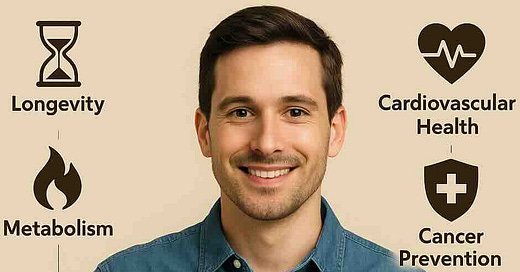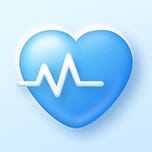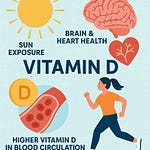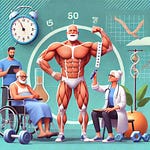Based on the meta research conducted by Dr. Rhonda Patrick’s team. Enjoy either the 12 minutes audio above or a crisp actionable text summary below.
1. Cardiovascular Health benefits
Reduced Disease Risk: Regular coffee drinkers have a "notably lower risk of cardiovascular diseases, including heart attacks and strokes—around a 10–15% risk reduction is observed for individuals consuming 2–3 cups per day."
Arrhythmia Reduction: Caffeine uniquely contributes to cardiovascular protection by "stabilizing heart rhythms," decreasing "arrhythmia risk significantly, by up to 17% in regular consumers," a benefit not shared by decaffeinated coffee.
2. Metabolic Health and Diabetes Prevention
Diabetes Risk Reduction: Drinking "two to three cups per day is linked to roughly a 60% reduced risk of developing diabetes."
Additional Benefits: Coffee also "positively modifies gut microbiota composition and reduces inflammation," further strengthening its metabolic advantages.
3. Cancer Protection
The International Agency for Research on Cancer (IARC) reclassified coffee in 2016, removing it from the list of possible carcinogens
Significant Risk Reductions: Extensive research shows significant reductions in cancer risks:
"a 15–20% lower risk of liver cancer."
"an approximately 10% reduction in endometrial cancer risk."
"an 11–54% lower risk of oral, pharynx, colon, prostate cancer and melanoma."
4. Gut Microbiome Health
SCFA Production: These microbes produce short-chain fatty acids (SCFAs), which are "crucial molecules that enhance gut barrier integrity, decrease inflammation, and improve insulin sensitivity."
Prebiotic Function: Coffee "functions effectively as a prebiotic, optimizing gut health."
Profound Impact: A 23,000-person dataset found coffee to be the "single strongest dietary factor shaping the microbiome, enriching 115 bacterial species."
5. Cognitive and Neurological Benefits
Neurodegenerative Disease Risk Reduction: Regular coffee consumption "significantly lowers the risk of neurodegenerative diseases like Parkinson’s and Alzheimer’s—by about 34–37%."
Cognitive Enhancement: Moderate caffeine intake "slows cognitive decline and enhances attention, reaction time, and memory."
6. Physical Performance Enhancement
Dosage: Consuming "caffeine at doses of 3–6 mg per kilogram of body weight significantly improves" physical performance.
Specific Benefits:
"endurance performance by 3–5%."
"strength output by 2–4%."
"cognitive tasks requiring sustained attention and vigilance by 10–15%."
Timing: "Ideal consumption occurs approximately 45–60 minutes before physical or mental tasks."
Caffeine Essential: "While decaf coffee has numerous benefits for other health outcomes, when it comes to physical performance, caffeine is the necessary component."
Caution: Caffeine intake "exceeding 400 mg daily may lead to adverse effects such as anxiety, increased heart rate, digestive discomfort, and sleep disruptions."
7. Optimal Timing of Coffee Consumption
The timing of coffee intake significantly impacts health outcomes.
Morning Consumption Superior: Research emphasizes that "coffee consumed early in the day profoundly enhances health outcomes compared to intake spread throughout the day or late at night."
2025 Mortality Study: A study of over 40,000 individuals found:
Morning consumers enjoyed "lower overall mortality rates and remarkable reductions in cardiovascular-related deaths."
"Compared to no coffee consumption, consuming 1–2, 2–3, and 3 or more cups per day in the morning was associated with a 16%, 29%, and 21% lower risk of all-cause mortality and a 30%, 48%, and 39% lower risk of cardiovascular disease mortality."
"In all-day drinkers, there was no reduction in mortality risk at any level of coffee consumption."
8. Caffeinated vs. Decaf Coffee: Distinct Benefits
Shared Benefits: Both types are "beneficial beverages linked to reduced mortality, lower cardiovascular and diabetes risk, and decreased risk of certain cancers."
Caffeine's Unique Role: "Caffeinated coffee distinctly surpasses decaf in protecting against neurodegenerative diseases such as Parkinson’s disease and potentially dementia—a finding that highlights caffeine's unique neuroprotective effects."
Flexibility for Consumers: "Individuals sensitive to caffeine can confidently opt for decaffeinated coffee, knowing they will still reap significant health benefits."
Optimal Consumption: "Optimal consumption remains moderate (approximately 2–4 cups daily)."
9. Coffee Additives and Supplements
Dairy Proteins: "Dairy proteins significantly slow the rapid absorption of beneficial polyphenols, an effect that could potentially diminish its immediate cognitive and anti-inflammatory effects."
MCTs: Medium-chain triglycerides (MCTs), often in "Bulletproof coffee" with butter/ghee, "may enhance cognitive performance, provide long-lasting energy, and even suppress appetite for weight loss."
L-theanine: When combined with coffee (caffeine), L-theanine "appears to alter the pharmacological profile of coffee and influence its effects on cognition and the nervous system," inducing relaxation, improving focus, and promoting sleep.
Conclusion and Recommendations
To fully optimize coffee’s health potential, the following practical guidelines are recommended:
Daily Consumption: "two to three cups of (preferably) filtered coffee."
Timing: "primarily in the morning."
Additives: Use "minimal additives."
Install our heart health and stress monitor app BreathNow to lower the risk of cardiovascular disease.













Share this post